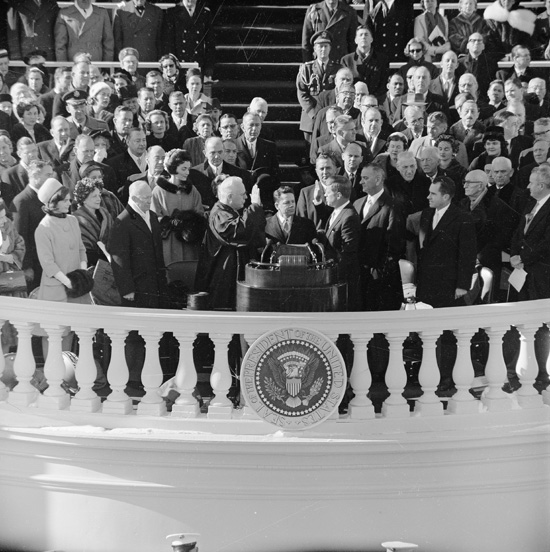Public Service Packs Great Power!
By Park Nahm-Sheik
“Ask not what your country can do for you, ask what you can do for your country!” This statement was at the heart of an audacious experiment in public service put forward by the then-U.S. Senator John F. Kennedy on a leg of his campaign for the office of President of the United States of America. He made this historic remark on October 14, 1960, at the University of Michigan. Some 10,000 students braved the chilly autumn air to hear him speak. This rousing call to arms JFK underpinned the incubation of the United States Peace Corps dating back to the early 1960s. Over 200,000 Americans have since responded to this rallying cry of JFK’s, going all over the globe to promote global friendship, peace, and prosperity.
Speaking of this spirit, it is interesting that many worldly possessions are often much better selflessly shared than selfishly hoarded. Note in this connection that anything of value shared with others can do mountains of good for everyone around, not just for the intended recipient of the thing shared. For a rising tide lifts all boats, not just any particular boat. In plain language, a rising tide practices no discrimination.
Let’s begin our discussion here by turning our attention to how riches can affect the wellbeing of a community depending on how they are shared. As they say, riches are like muck that stinks in a heap but spread abroad makes the earth fruitful. If so, it should make a lot of sense to donate much of what we own so as to have our collective wealth more evenly spread out for everyone’s sake. Anyway, we can’t take it with us when we die, can we? Besides, fairly shared wealth can have the added advantage of helping grow the overall economy, playing a pivotal role in the creation of a stable and prosperous society. It takes no genius to figure out why many intellectuals think highly of a socialist-leaning national setup, like in Sweden, Finland, Norway, etc. Who wouldn’t appreciate getting their medical and educational bills paid out of public chests? Who wouldn’t like to become free from the shackles of exorbitant taxation and skyrocketing costs of living?
Let’s remind ourselves that public service of the type we are talking about here benefits not just those it is primarily meant for. It’s good for everyone around, including even the public-service providers themselves. Incidentally, an aptly coined Kennedyesque slogan would deserve pride of place in every project put together and administered by the Gwangju International Center. What about one asking the citizens of Gwangju and Jeonnam what they can do for the region, not what the region can do for them? Should they care, Dr. Shin Gyonggu and his GIC staff are more than welcome to contribute their thoughts to improve upon this makeshift suggestion of mine.
By the way, we may pride ourselves on hailing from a culture of pro bono work that stretches way back into the dawn of the country’s history. A public-service work ethic is thus kind of engraved in our collective DNA. Well into my boyhood, pro bono collaboration among neighbors was well and very much alive in most rural pockets of the country. It was quite common for neighbors to lend a helping hand to one another, putting on a thatch roof, putting up a stone wall around a farmyard. We used to take communal celebrations for granted, partaking of one another’s joyous occasions. Wedding feasts and milestone birthday banquets for neighbors thus were the joint business of the entire neighborhood. A neighbor’s sixtieth birthday party was one such occasion when all the villagers, young and old, joined in. The way they so sincerely feted their neighbors was so heartwarming.
Still quite vivid is my memory of student volunteer workers heading out to rural areas to help out shorthanded farm workers in peak farming season. Often, they repaired tools like hoes, sickles, shovels, etc., as needed wherever possible. Even more importantly, they played a key role in teaching late-night classes to help eradicate illiteracy from much of remote rural Korea. Medical, dental, and nursing students provided emergency healthcare service, sometimes with high-end expert help from their professors. Also, legions of student tree planters made their presence felt in national reforestation campaigns, especially in the fourth quarter of the preceding century. Student volunteers also had work cut out for them in towns and cities, where they often helped the less well-off of their fellow students catch up on schoolwork. They just didn’t want to leave any of their fellow countrymen behind, though. It may well be that the desire for talent donation was in their genes all along.
Our predecessors were often more than ready to make the ultimate donation for the good of the community. They always came forward firmly determined to lay down their lives in defense of the national sovereignty of their beloved country. We all owe a lot to these endless contingents of pro bono workers. Finally, a word or two may be in order about a few nationwide public service entities. Some NGOs immediately come to mind here. Topping the list are the CCK (the Community Chest of Korea, founded in 1998) and the Green Umbrella of Korea, established in 1948. These two NGOs have been managing widely recognized social welfare funds dedicated to the general Korean population and to the younger generation growing into future leaders of the country, respectively. Long live this beautiful culture of pro bono talent donation!
The Author
Park Nahm-Sheik is a native of Gwangju. After graduating from Chonnam National University, he went on to receive a master’s degree at the University of Hawaii and a phD (applied linguistics) at Georgetown University, both in the U.S. Upon completing a long career at Seoul National University, prof. Park served as president of the International Graduate School of English.




